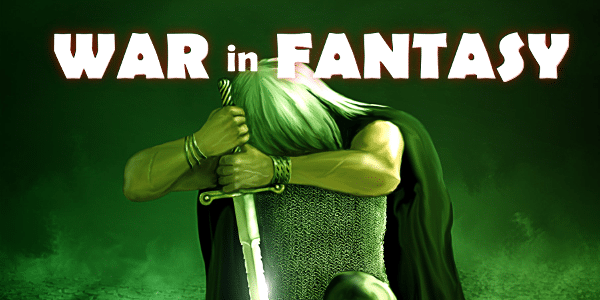
War is a common topic in fantasy. Not every story is about a war, or contains one, but at least in epic fantasy, they are more common than not. There is something about the scope and the stakes involved in war that fit the typical epic fantasy mold. How those wars are handled can vary all over the spectrum, from realistic to idealized, from a personal perspective to a grand overview. Consider all the ways that war can be portrayed in fantasy.
How Close You Get
- Up Close and Personal – This method follows a character or series of characters at “ground level” in the middle of the fighting. You get to see the battle as a soldier would, seeing, hearing, and smelling right along with them.
- The Commander’s View – Often a story will revolve around the leaders of a kingdom, and thus the perspective will shift to that of someone who sees the battle from the edges – a protected location, if not outside the actual fighting entirely. The major action may be seen from a hilltop, through a spyglass, or relayed via messengers. This is a strategic view, giving the reader the full scope of the conflict.
- Not Even on Page – You can have a book filled with war and battles, yet rarely see them. A Song of Ice and Fire is filled with kings vying for control of Westeros, but more of the actual fighting is done between the chapters, rather than in them. This method can convey the ramifications of a war without showing you the action.
Grit or Glory
“War is Hell.” -Gen. William Tecumseh Sherman
Not every fantasy story adheres to this creed. You’ll find fantasy of a more chivalrous bent still clinging to the idea of war as a means of acquiring glory. Most modern fantasies (as well as such classics as Tolkien), bear in mind that war involves a gratuitous loss of life, and that most heroes aren’t overly fond of the actual fighting part of war.
Of course, this isn’t to say that certain characters can’t take pride in both their prowess and their deeds. If they harbor regrets or ill feelings from their service, they hide it or force themselves to forget. There will also be those with different morals, for whom the fighting is about the glory. Some cultures revere the warrior, from Spartan to Viking, and many others besides. It is fine for fantasy to reflect those types of cultural beliefs, even in constructed societies.
How Fantastical
Two armies march into battle. Will the battle be decided by sword and shield, or will wizards and fantastical creatures hold sway. This is a hairy subject for war in fantasy, because all too often it may be that two armies of thousands of soldiers play little part in the outcome of the battle. The true conflict is played out between magic wielders that are beyond the power of normal men. This can have many reasons. It could be that one side has access to a magical power that the other lacks, and that disparity (and finding a solution to it) is a driver for the plot. It could also be that the protagonist(s) has magical power, and shines as a great light and hope among his or her people. This can be a justification for why the story centers around them.
The trouble to watch for is that the conflict seems reasonable in the context of the story. If armies are routinely wiped out as collateral damage when two wizards fight, why are kingdoms going to the trouble and expense to raise and equip armies? Wouldn’t the kingdom be better off if those soldiers were plowing fields or building ships? If dragons dominate the skies above a battlefield, why do armies still march across in heavy, metal armor, just waiting to be roasted alive in portable ovens? Wouldn’t it make more sense for more troops to be archers, and to take up a skirmishing type of fighting?
Repercussions
When the battle ends, what does the reader see? A parade, a coronation, a treaty signing, or a conciliatory wedding? What of the burned cities, the thousands of dead, the widows and orphans and roving bandits preying in the chaos following the war? Do the veterans simply pick up where their lives left off, as if nothing happened? Does war change these characters at all? Despair, regret, bitterness, and anger are all common; they may not effect everyone, but they will be issues for many returning from the war. While PTSD is a modern concept, it’s merely that we have a term and a diagnosis for post traumatic stress, not that it never existed before. If a fantasy world wants to feel real, it should bear in mind what we modern humans know of psychology, even if none of the characters understand the underlying reasons.

0 Comments